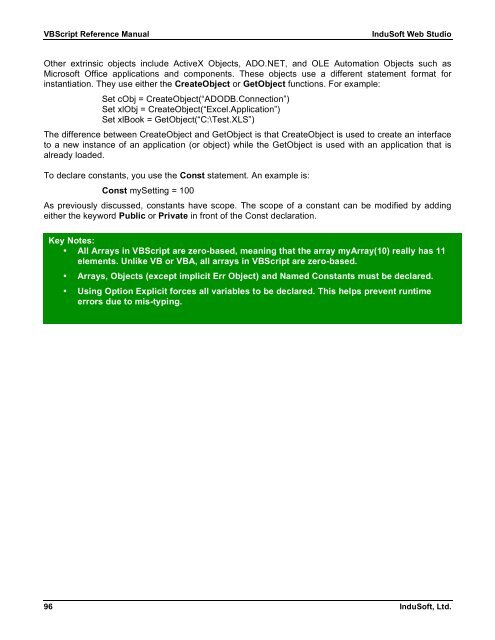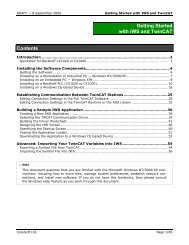- Page 1 and 2:
VBScript Reference Manual for InduS
- Page 3 and 4:
InduSoft Web Studio VBScript Refere
- Page 5 and 6:
InduSoft Web Studio VBScript Refere
- Page 7 and 8:
InduSoft Web Studio VBScript Refere
- Page 9 and 10:
InduSoft Web Studio VBScript Refere
- Page 11 and 12:
InduSoft Web Studio VBScript Refere
- Page 13 and 14:
InduSoft Web Studio VBScript Refere
- Page 15 and 16:
InduSoft Web Studio VBScript Refere
- Page 17 and 18:
InduSoft Web Studio VBScript Refere
- Page 19 and 20:
InduSoft Web Studio VBScript Refere
- Page 21 and 22:
InduSoft Web Studio VBScript Refere
- Page 23 and 24:
InduSoft Web Studio VBScript Refere
- Page 25 and 26:
InduSoft Web Studio VBScript Refere
- Page 27 and 28:
InduSoft Web Studio VBScript Refere
- Page 29 and 30:
InduSoft Web Studio VBScript Refere
- Page 31 and 32:
InduSoft Web Studio VBScript Refere
- Page 33 and 34:
InduSoft Web Studio VBScript Refere
- Page 35 and 36:
InduSoft Web Studio VBScript Refere
- Page 37 and 38:
InduSoft Web Studio VBScript Refere
- Page 39 and 40:
InduSoft Web Studio VBScript Refere
- Page 41:
InduSoft Web Studio VBScript Refere
- Page 44 and 45:
VBScript Reference Manual InduSoft
- Page 46 and 47: VBScript Reference Manual InduSoft
- Page 48 and 49: VBScript Reference Manual InduSoft
- Page 50 and 51: VBScript Reference Manual InduSoft
- Page 52 and 53: VBScript Reference Manual InduSoft
- Page 54 and 55: VBScript Reference Manual InduSoft
- Page 56 and 57: VBScript Reference Manual InduSoft
- Page 58 and 59: VBScript Reference Manual InduSoft
- Page 60 and 61: VBScript Reference Manual InduSoft
- Page 62 and 63: VBScript Reference Manual InduSoft
- Page 64 and 65: VBScript Reference Manual InduSoft
- Page 66 and 67: VBScript Reference Manual InduSoft
- Page 68 and 69: VBScript Reference Manual InduSoft
- Page 70 and 71: VBScript Reference Manual InduSoft
- Page 72 and 73: VBScript Reference Manual InduSoft
- Page 74 and 75: VBScript Reference Manual InduSoft
- Page 76 and 77: VBScript Reference Manual InduSoft
- Page 78 and 79: VBScript Reference Manual InduSoft
- Page 80 and 81: VBScript Reference Manual InduSoft
- Page 82 and 83: VBScript Reference Manual InduSoft
- Page 84 and 85: VBScript Reference Manual InduSoft
- Page 86 and 87: VBScript Reference Manual InduSoft
- Page 88 and 89: VBScript Reference Manual InduSoft
- Page 90 and 91: VBScript Reference Manual InduSoft
- Page 92 and 93: VBScript Reference Manual InduSoft
- Page 94 and 95: VBScript Reference Manual InduSoft
- Page 98 and 99: VBScript Reference Manual InduSoft
- Page 100 and 101: VBScript Reference Manual InduSoft
- Page 102 and 103: VBScript Reference Manual InduSoft
- Page 104 and 105: VBScript Reference Manual InduSoft
- Page 106 and 107: VBScript Reference Manual InduSoft
- Page 108 and 109: VBScript Reference Manual InduSoft
- Page 110 and 111: VBScript Reference Manual InduSoft
- Page 112 and 113: VBScript Reference Manual InduSoft
- Page 114 and 115: VBScript Reference Manual InduSoft
- Page 116 and 117: VBScript Reference Manual InduSoft
- Page 118 and 119: VBScript Reference Manual InduSoft
- Page 120: VBScript Reference Manual InduSoft
- Page 123 and 124: InduSoft Web Studio VBScript Refere
- Page 125 and 126: InduSoft Web Studio VBScript Refere
- Page 127 and 128: InduSoft Web Studio VBScript Refere
- Page 129 and 130: InduSoft Web Studio VBScript Refere
- Page 131 and 132: InduSoft Web Studio VBScript Refere
- Page 133 and 134: InduSoft Web Studio VBScript Refere
- Page 135 and 136: InduSoft Web Studio VBScript Refere
- Page 137 and 138: InduSoft Web Studio VBScript Refere
- Page 139 and 140: InduSoft Web Studio VBScript Refere
- Page 141 and 142: InduSoft Web Studio VBScript Refere
- Page 143 and 144: InduSoft Web Studio VBScript Refere
- Page 145 and 146: InduSoft Web Studio VBScript Refere
- Page 147 and 148:
InduSoft Web Studio VBScript Refere
- Page 149 and 150:
InduSoft Web Studio VBScript Refere
- Page 151 and 152:
InduSoft Web Studio VBScript Refere
- Page 153 and 154:
InduSoft Web Studio VBScript Refere
- Page 155 and 156:
InduSoft Web Studio VBScript Refere
- Page 157 and 158:
InduSoft Web Studio VBScript Refere
- Page 159 and 160:
InduSoft Web Studio VBScript Refere
- Page 161 and 162:
InduSoft Web Studio VBScript Refere
- Page 163 and 164:
InduSoft Web Studio VBScript Refere
- Page 165 and 166:
InduSoft Web Studio VBScript Refere
- Page 167 and 168:
InduSoft Web Studio VBScript Refere
- Page 169 and 170:
InduSoft Web Studio VBScript Refere
- Page 171 and 172:
InduSoft Web Studio VBScript Refere
- Page 173 and 174:
InduSoft Web Studio VBScript Refere
- Page 175 and 176:
InduSoft Web Studio VBScript Refere
- Page 177 and 178:
InduSoft Web Studio VBScript Refere
- Page 179 and 180:
InduSoft Web Studio VBScript Refere
- Page 181 and 182:
InduSoft Web Studio VBScript Refere
- Page 183 and 184:
InduSoft Web Studio VBScript Refere
- Page 185 and 186:
InduSoft Web Studio VBScript Refere
- Page 187 and 188:
InduSoft Web Studio VBScript Refere
- Page 189 and 190:
InduSoft Web Studio VBScript Refere
- Page 191 and 192:
InduSoft Web Studio VBScript Refere
- Page 193 and 194:
InduSoft Web Studio VBScript Refere
- Page 195 and 196:
InduSoft Web Studio VBScript Refere
- Page 197 and 198:
InduSoft Web Studio VBScript Refere
- Page 199 and 200:
InduSoft Web Studio VBScript Refere
- Page 201 and 202:
InduSoft Web Studio VBScript Refere
- Page 203 and 204:
InduSoft Web Studio VBScript Refere
- Page 205 and 206:
InduSoft Web Studio VBScript Refere
- Page 207 and 208:
InduSoft Web Studio VBScript Refere
- Page 209 and 210:
InduSoft Web Studio VBScript Refere
- Page 211 and 212:
InduSoft Web Studio VBScript Refere
- Page 213 and 214:
InduSoft Web Studio VBScript Refere
- Page 215 and 216:
InduSoft Web Studio VBScript Refere
- Page 217 and 218:
InduSoft Web Studio VBScript Refere
- Page 219 and 220:
InduSoft Web Studio VBScript Refere
- Page 221 and 222:
InduSoft Web Studio VBScript Refere
- Page 223 and 224:
InduSoft Web Studio VBScript Refere
- Page 225 and 226:
InduSoft Web Studio VBScript Refere
- Page 227 and 228:
InduSoft Web Studio VBScript Refere
- Page 229 and 230:
InduSoft Web Studio VBScript Refere
- Page 231 and 232:
InduSoft Web Studio VBScript Refere
- Page 233 and 234:
InduSoft Web Studio VBScript Refere
- Page 235 and 236:
InduSoft Web Studio VBScript Refere
- Page 237 and 238:
InduSoft Web Studio VBScript Refere
- Page 239 and 240:
InduSoft Web Studio VBScript Refere
- Page 241 and 242:
InduSoft Web Studio VBScript Refere
- Page 243 and 244:
InduSoft Web Studio VBScript Refere
- Page 245 and 246:
InduSoft Web Studio VBScript Refere
- Page 247 and 248:
InduSoft Web Studio VBScript Refere
- Page 249 and 250:
InduSoft Web Studio VBScript Refere
- Page 251 and 252:
InduSoft Web Studio VBScript Refere
- Page 253 and 254:
InduSoft Web Studio VBScript Refere
- Page 255:
InduSoft Web Studio VBScript Refere



